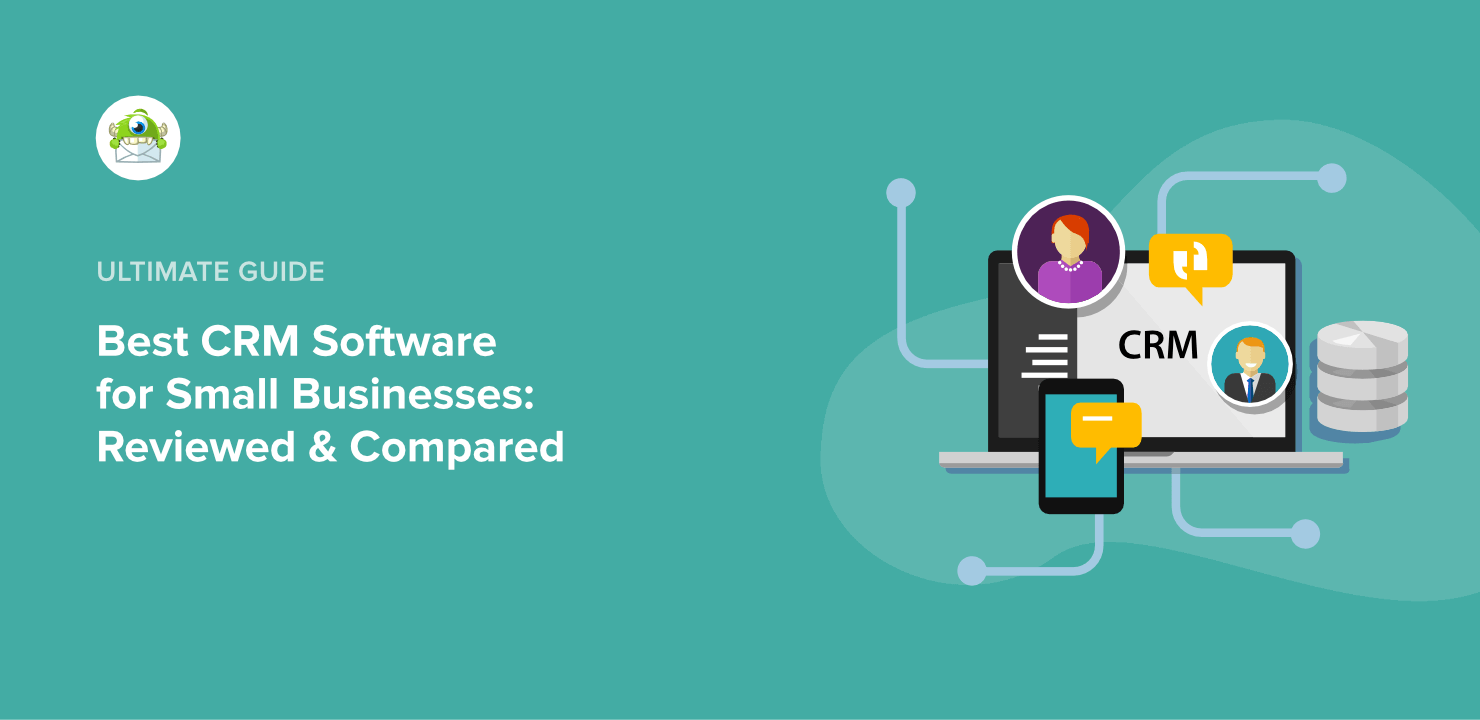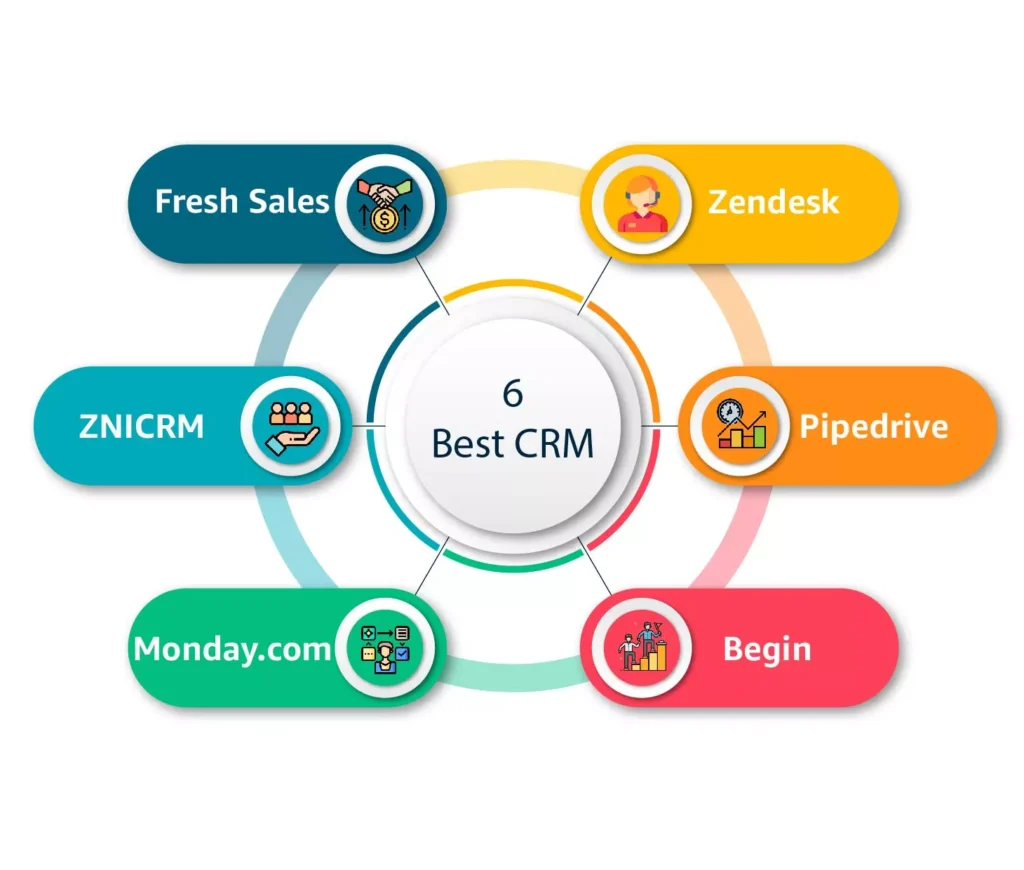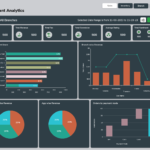Navigating the world of CRM tools can be tough for small businesses. The right CRM can streamline your operations and boost customer satisfaction.
In 2024, many new tools have emerged, each offering unique features. Small businesses need efficient CRM tools to manage customer relationships. These tools help track interactions, manage data, and automate tasks. With many options available, choosing the right one can be overwhelming.
This list aims to guide you through the top CRM tools for 2024, focusing on their benefits for small businesses. Whether you are looking for simplicity, advanced features, or affordability, there’s a CRM tool on this list to meet your needs. Stay tuned to discover which tool can help your business thrive.

Credit: www.linkedin.com
Introduction To Crm Tools
Customer Relationship Management (CRM) tools are essential for managing customer interactions. These tools help businesses streamline processes and improve customer satisfaction. For small businesses, using a CRM can be a game-changer. It helps you stay organized and improve customer relationships. This blog post will explore the importance of CRM tools for small businesses in 2024.
Importance For Small Businesses
Small businesses need to focus on building strong customer relationships. A CRM tool helps achieve this by organizing customer information in one place. It allows small businesses to track customer interactions and sales. This helps in making informed decisions and providing personalized services. A good CRM can also automate tasks, saving time and reducing errors.
Key Features To Look For
When choosing a CRM tool, look for certain key features. These features ensure the tool meets your business needs. Here are some important ones:
- Contact Management: Store and organize customer information.
- Interaction Tracking: Keep track of customer interactions.
- Sales Management: Manage sales pipelines and forecasts.
- Task Automation: Automate repetitive tasks to save time.
- Reporting and Analytics: Generate reports to analyze business performance.
- Integration: Integrate with other tools and platforms you use.
Choosing the right CRM tool is crucial for small businesses. It can enhance productivity and customer satisfaction. Make sure to consider these features while selecting a CRM tool for your business.
Explore the depths of CRM and Customer Support with this informative post. Saas CRMs for Multilingual Customer Support: Boost Global Engagement
Benefits Of Crm Tools
Small businesses thrive on efficient operations and strong customer relationships. CRM tools provide multiple benefits, helping businesses grow in a structured manner. These tools streamline processes and enhance interactions with customers, improving overall productivity.
Streamlining Operations
CRM tools help small businesses organize their data in one place. This saves time spent searching for information. Automated workflows handle repetitive tasks, reducing the workload. As a result, staff focus on more critical activities. This boosts efficiency.
Another advantage is better coordination among team members. CRM systems provide a shared platform, facilitating communication. Everyone stays on the same page, reducing errors. This leads to smoother operations and fewer misunderstandings.
Enhancing Customer Relationships
CRM tools store detailed customer information. This helps businesses understand their customers better. Knowing customer preferences allows for personalized interactions. Personalized service builds stronger relationships and increases loyalty.
Additionally, CRM systems track customer interactions. This helps businesses respond promptly to inquiries and concerns. Quick responses show customers they are valued. Happy customers are more likely to return and recommend the business to others.
CRM tools also help in analyzing customer data. This analysis identifies trends and preferences. Businesses can then tailor their marketing strategies accordingly. Targeted marketing improves customer engagement and boosts sales.
Choosing The Right Crm
Choosing the right CRM can make or break a small business. In 2024, the market offers many options. Each tool has its own strengths. To select the best fit, consider a few key factors.
Assessing Business Needs
First, assess your business needs. Identify the specific problems a CRM can solve. Do you need help with customer communication? Or is lead tracking more crucial? Knowing your requirements will narrow your options.
Consider the size of your team. Some CRMs are better for small teams. Others offer features suited for larger groups. Make a list of must-have features. Compare these with what each CRM offers. This will help you find the perfect match.
Curious about CRM and Customer Support? This post offers a deeper understanding. Why Does Zoho CRM Have List Descending: Top Benefits Explained
Budget Considerations
Next, think about your budget. CRM tools vary in price. Some offer free plans. Others charge monthly fees. Determine how much you can afford. Remember, a higher price does not always mean better quality.
Look for hidden costs. Some CRMs charge for extra features. Others may have costs for additional users. Make sure you understand all fees involved. This will prevent surprises later.
Choosing the right CRM involves careful consideration. Assess your business needs and budget. This approach will help you find a tool that enhances your small business in 2024.

Credit: optinmonster.com
Top Crm Tools In 2024
As we step into 2024, small businesses need efficient CRM tools. These tools help streamline operations and boost customer relationships. Here, we explore the top CRM tools for small businesses in 2024.
Tool 1 Overview
Tool 1 is a versatile CRM solution. It offers an intuitive interface and powerful features. Small businesses can benefit from its ease of use and affordability.
| Feature | Description |
|---|---|
| Contact Management | Manage customer information with ease. |
| Email Integration | Syncs with major email providers. |
| Reporting | Generate detailed reports. |
Tool 2 Overview
Tool 2 excels in automation. It helps automate sales processes, saving time and effort. It’s perfect for small teams looking to maximize productivity.
- Automated Workflows
- Lead Scoring
- Sales Pipeline Management
These features allow businesses to focus more on customer engagement.
Tool 3 Overview
Tool 3 stands out for its customization options. It allows businesses to tailor the CRM to their specific needs. It’s suitable for small businesses seeking flexibility.
- Custom Fields
- Drag-and-Drop Interface
- Third-Party Integrations
These capabilities make it a robust choice for growing businesses.
Crm Tool Comparisons
Choosing the right CRM tool can make or break your small business. With many options available, it’s crucial to compare their features, pricing, and benefits. Let’s dive into the comparisons of top CRM tools for small businesses in 2024.
Features Comparison
Each CRM tool offers a unique set of features. Here’s a comparison of some key aspects:
| CRM Tool | Contact Management | Email Integration | Automation | Mobile Access |
|---|---|---|---|---|
| Tool A | Yes | Yes | Yes | Yes |
| Tool B | Yes | No | Yes | No |
| Tool C | Yes | Yes | No | Yes |
Discover engaging insights on CRM and Customer Support by reading this featured article. Real-Time Metrics Tracking for E-Commerce CRM Users: Boost Sales Now
Pricing Comparison
Pricing is a crucial factor for small businesses. Here’s a look at the pricing of top CRM tools:
| CRM Tool | Free Plan | Basic Plan | Pro Plan |
|---|---|---|---|
| Tool A | Yes | $12/month | $25/month |
| Tool B | No | $15/month | $30/month |
| Tool C | Yes | $10/month | $20/month |
Choosing a CRM tool involves comparing features and pricing. Ensure the tool you choose fits your business needs and budget. By doing so, you’ll make the best decision for your small business in 2024.
Implementing Crm In Your Business
Implementing CRM in your business can seem like a big task. But with the right steps, it becomes easy. CRM tools help manage customer relationships. They store data, track interactions, and automate tasks. This leads to better customer service and higher sales. Let’s dive into how you can implement a CRM in your small business.
Step-by-step Guide
Follow these steps to implement CRM in your business:
- Identify Your Needs: Determine what you need from a CRM. Do you need to manage customer data, track sales, or automate tasks?
- Choose the Right CRM: Select a CRM that fits your needs and budget. Consider features, ease of use, and customer support.
- Train Your Team: Ensure your team knows how to use the CRM. Offer training sessions and resources.
- Import Data: Transfer your existing data to the new CRM. This includes customer information, past interactions, and sales history.
- Customize the CRM: Tailor the CRM to your business needs. Adjust settings, create custom fields, and set up workflows.
- Monitor and Adjust: Track the CRM’s performance. Make adjustments as needed to improve efficiency.
Common Pitfalls To Avoid
Be aware of these common mistakes when implementing a CRM:
- Skipping Training: Your team needs to understand how to use the CRM. Without training, they may not use it correctly.
- Overcomplicating the Setup: Start simple. Avoid adding too many features at once. This can overwhelm your team.
- Ignoring Data Quality: Ensure your data is accurate and up-to-date. Poor data quality can lead to errors and inefficiencies.
- Neglecting User Feedback: Listen to your team. Their feedback can help you identify issues and make improvements.
- Forgetting to Review and Adjust: Regularly review the CRM’s performance. Make adjustments to ensure it meets your needs.
Maximizing Crm Efficiency
Maximizing CRM efficiency is crucial for small businesses aiming to improve customer relationships. Efficient use of CRM tools can save time, boost productivity, and enhance customer satisfaction. This section provides best practices for optimizing your CRM and integrating it with other tools.
Best Practices
Set clear goals for your CRM usage. Define what you want to achieve. Regularly clean and update your data. Accurate data ensures better decision-making. Train your team thoroughly. Everyone should know how to use the CRM effectively. Customize your CRM to fit your business needs. Use only the features that benefit your company.
Integrating With Other Tools
Integrate your CRM with email marketing tools. This allows for seamless communication with customers. Connect your CRM to your social media platforms. Track interactions and engage with your audience better. Use CRM integrations with project management tools. Ensure tasks and customer information are managed in one place. Sync your CRM with accounting software. Simplify invoicing and financial tracking.

Credit: www.selecthub.com
Future Trends In Crm
As we approach 2024, the evolution of CRM tools shows no sign of slowing down. Small businesses need to stay informed about the latest trends to remain competitive. The future of CRM is shaped by several key trends. Two of the most influential are AI and Automation and Personalization.
Ai And Automation
AI and automation are becoming essential in CRM tools. They help businesses save time and reduce errors. Small businesses benefit from these advancements in several ways:
- Automated Data Entry: AI can automatically log interactions and update records.
- Predictive Analytics: AI predicts customer behavior, helping businesses make better decisions.
- Chatbots: Automated chatbots handle customer queries 24/7, improving customer service.
These tools allow small businesses to focus on building relationships, not managing data.
Personalization
Personalization is key to customer satisfaction. CRM tools are making it easier to deliver personalized experiences. Here are some ways small businesses can leverage personalization:
- Segmentation: Group customers based on behavior and preferences.
- Tailored Communication: Send targeted messages that resonate with each segment.
- Customized Offers: Provide offers and recommendations based on customer data.
These personalized approaches help small businesses connect with customers on a deeper level.
Case Studies
Understanding how small businesses thrive using CRM tools can be enlightening. Real-life examples highlight the effectiveness and practical benefits of these tools. Let’s dive into some inspiring case studies showcasing the top CRM tools for small businesses in 2024.
Success Stories
Here are some remarkable success stories of small businesses that leveraged CRM tools:
| Business | CRM Tool | Outcome |
|---|---|---|
| Local Bakery | Zoho CRM | Increased customer retention by 40% |
| Freelance Graphic Designer | HubSpot CRM | Doubled client acquisition in 6 months |
| Online Retail Store | Salesforce Essentials | Boosted sales by 30% |
Lessons Learned
These businesses have learned valuable lessons while using CRM tools:
- Local Bakery: Prioritizing customer feedback helps improve products and services.
- Freelance Graphic Designer: Automating follow-up emails saves time and increases engagement.
- Online Retail Store: Tracking sales data helps identify market trends and opportunities.
Small businesses benefit from these insights and experiences. Adopting CRM tools brings measurable improvements. Optimize customer interactions. Streamline processes. Drive growth. Learn from these examples and apply the lessons to your business strategy.
Frequently Asked Questions
What Are The Best Crm Tools For Small Businesses?
Top CRM tools for small businesses in 2024 include HubSpot, Zoho CRM, and Salesforce Essentials. These tools offer user-friendly interfaces, automation features, and scalability. They help manage customer interactions, sales, and marketing efficiently.
How Can Crm Tools Benefit Small Businesses?
CRM tools streamline customer relationship management, improve communication, and boost sales. They help small businesses manage leads, track interactions, and automate tasks. This leads to better customer satisfaction and increased productivity.
Are Crm Tools Expensive For Small Businesses?
Many CRM tools offer affordable pricing plans tailored for small businesses. Options like HubSpot and Zoho CRM have free plans and scalable paid tiers. These tools provide excellent value for the cost.
Which Crm Tool Is Easiest To Use?
HubSpot CRM is known for its ease of use. It has an intuitive interface and offers robust features. Its simplicity and comprehensive support make it a favorite among small businesses.
Conclusion
Choosing the right CRM tool is crucial for small businesses in 2024. It helps manage customer relations efficiently. Each tool offers unique features tailored to different needs. Evaluate your business requirements carefully. Pick a CRM that fits your budget and goals.
Stay ahead by keeping your customers happy. Investing in the right CRM can make a big difference. Start exploring these tools today. Your business deserves the best support available.











